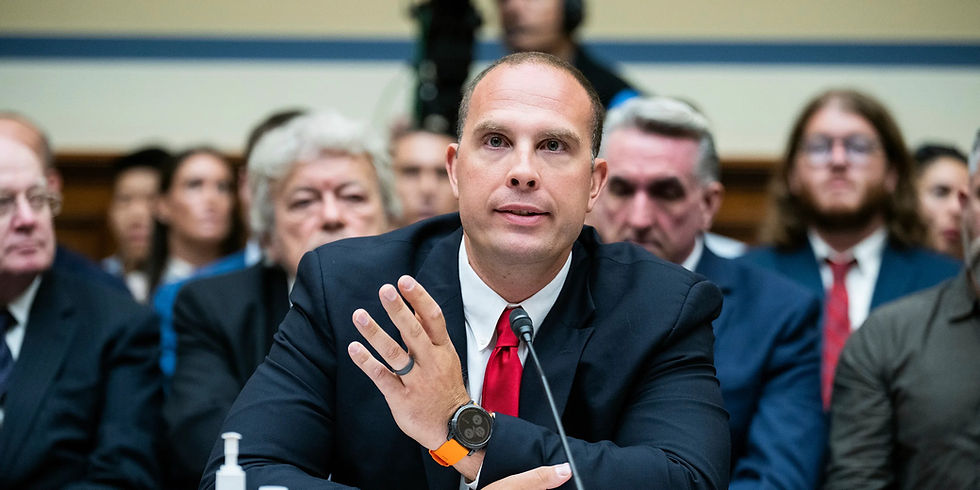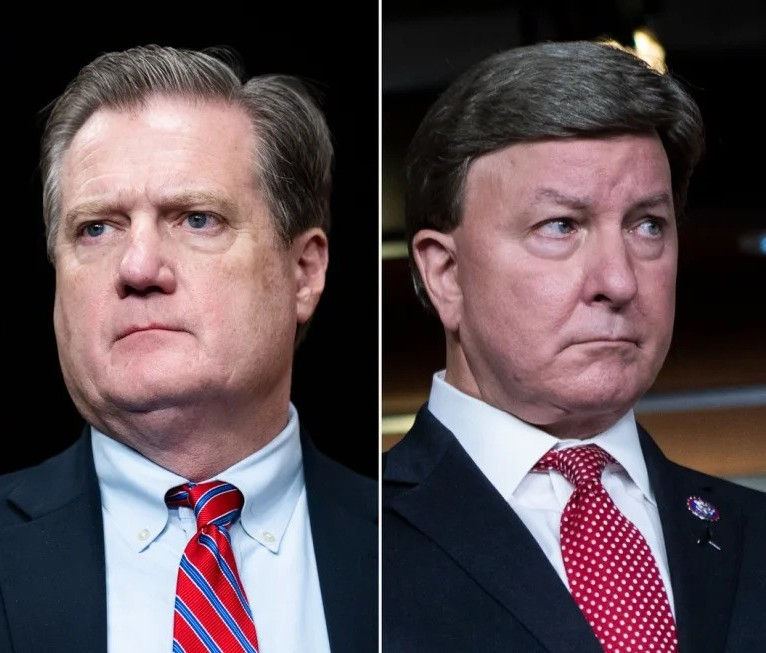Congress Mentioned "Non-Human Intelligence" 24 Times - Here's What That Really Means with Mike Rounds
- Cristina Gomez

- Jul 1, 2025
- 4 min read
Updated: Jul 25, 2025
In a moment that lasted mere seconds but could reshape our understanding of government secrecy, Senator Mike Rounds made a very revealing verbal slip. During his interview with NewsNation’s Ross Coulthart, the South Dakota Republican and member of the Senate Intelligence Committee said it would be “crazy for us to believe that we really were alone in the world” — before quickly correcting himself to say “universe.”
For most people discussing extraterrestrial life, the natural reference point would be the cosmos. But when a sitting Senator’s mind goes to “world” first while talking about alien intelligence, it suggests something far more terrestrial — and far more immediate — than distant civilizations among the stars. This Freudian slip, captured in what should have been routine political discourse, may have accidentally exposed what senior members of Congress actually know about non-human intelligence operating on Earth. Mike Rounds mentioned Non-Human Intelligence 24 times in UAPDA.
The significance of this verbal stumble becomes even more apparent when considered alongside Rounds’ other explosive revelations during the interview. As a member of both the Senate Intelligence and Armed Services Committees — the two most powerful oversight bodies for America’s deepest secrets — Rounds disclosed that Congress has crafted legislation mentioning “non-human intelligence” exactly 24 times. This represents a dramatic departure from the vague language typically used in government documents about “unexplained phenomena.” Instead, this is Congress directly acknowledging the possibility that we are not alone and that elements within the government may have been concealing evidence.
The Grusch Catalyst and Congressional Response
The current push for unprecedented UFO transparency can be traced directly to July 2023, when former intelligence officer David Grusch delivered testimony that fundamentally altered the political landscape surrounding UAPs. Under oath before Congress, Grusch testified that the US government has been operating a “multi-decade UAP crash retrieval and reverse-engineering program.” When pressed about whether the government had recovered “non-human biologics,” Grusch’s response was unequivocal: “Non-human, and that was the assessment of people with direct knowledge on the program I talked to that are currently still on the program.”

This testimony sent immediate shockwaves through Washington’s political establishment and directly motivated Senators Chuck Schumer and Mike Rounds to craft what became the UAP Disclosure Act. Rounds explained their reasoning with remarkable candor: “We wanted to make sure that people knew that we weren’t hiding from the possibility.” The resulting legislation was 64 pages of legal precision that represented the most aggressive transparency effort in American history, including provisions for eminent domain that would allow the government to legally confiscate “technologies of unknown origin and biological evidence of non-human intelligence” from private companies.
The House Resistance and What It Reveals
Despite sailing through the Senate, this groundbreaking legislation encountered fierce resistance in the House of Representatives. Two Republican representatives — Mike Rogers and Mike Turner — reportedly killed the most powerful provisions. When Coulthart pressed Rounds about this opposition, the Senator’s diplomatic response couldn’t mask the underlying implications. Rounds suggested his House colleagues were concerned about disclosing “very sensitive information about either our adversary’s capabilities or about our own capabilities.”

However, the most telling aspect isn’t what Rounds said, but what the resistance itself reveals. When legislation explicitly authorizing government confiscation of non-human technology and biologics gets systematically dismantled, it strongly suggests there’s something worth confiscating. The very existence of such detailed legal language implies that congressional leadership has been briefed on materials requiring such extraordinary measures.
Criminal Concealment and Federal Investigations
Perhaps most alarming are Rounds’ revelations about the potentially criminal nature of the alleged concealment. The Senator confirmed that “multiple credible sources have indicated UAP information has been improperly, perhaps illegally, withheld from Congress.” This transcends normal classification procedures — it represents potential criminal concealment from the very officials constitutionally required to provide oversight.

Even more seriously, Rounds confirmed an ongoing FBI investigation into these allegations, encompassing not just UAP sightings but federal crimes. According to some whistleblowers, these investigations include allegations of murder committed to protect these secrets. Rounds also expressed grave concern about compartmentalization potentially hampering America’s technological development while adversaries like China and Russia might be leveraging non-human technology, creating what he called “siloing” that makes the United States “less safe.”
The Strategic 2025 Campaign
Despite previous setbacks, Rounds confirmed they’re reintroducing the UAP Disclosure Act in 2025, employing what appears to be sophisticated psychological warfare against the establishment. Their strategy involves crafting legislation so comprehensive and demanding that even achieving half their objectives would represent the biggest transparency victory in UFO history. It’s classic negotiation tactics — start with maximum demands so your “compromise” position is actually your real goal.
The timing appears advantageous, with new House leadership potentially bringing fresh perspectives and mounting public pressure. The Pentagon’s All-Domain Anomaly Resolution Office (AARO) now admits they’re tracking over 1,600 UAP reports, with hundreds remaining completely unexplained. Their own scientists increasingly use terms like “true anomalies” and acknowledge objects demonstrating “unusual flight characteristics” that challenge known physics.
The Implications of Disclosure
When Senator Rounds addressed what disclosure might mean for humanity, his language revealed the gravity of what may be at stake. He spoke of potential “contact with something that we didn’t believe was from this world” and described disclosure as potentially representing “one of the greatest announcements in the history of mankind that we are not alone.”
As the 2025 National Defense Authorization Act approaches, representing the next battleground for this transparency fight, Senator Rounds’ verbal slip — thinking “world” before “universe” — may have inadvertently confirmed what many have long suspected. The truth about non-human intelligence may not be light-years away in some distant galaxy. It may be right here on Earth, hidden in plain sight.
Sources















Comments